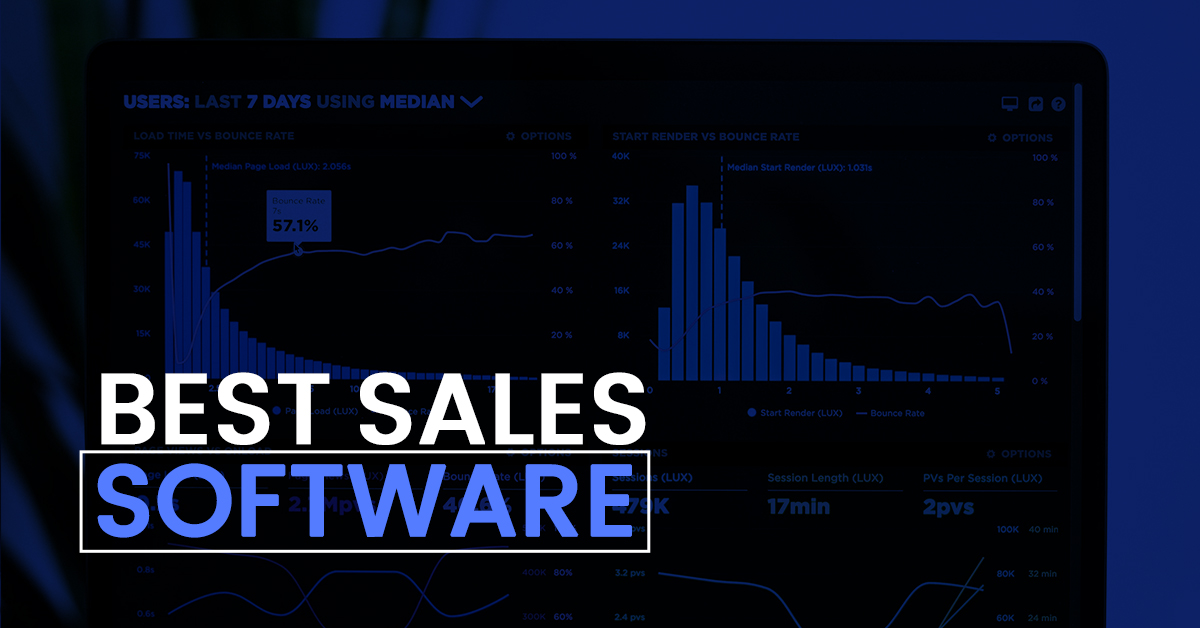
7 Clickfunnels Alternatives That Will Boost Your Sales and Conversions
Every business owner needs a powerful sales funnel to convert website visitors into paying customers. Clickfunnels is a tool that allows you to do just
Home » Sales

Every business owner needs a powerful sales funnel to convert website visitors into paying customers. Clickfunnels is a tool that allows you to do just

Sales is a critical part of any business. If you want to make more money, you need to be able to sell more products and

Do you want to close more deals and boost your sales productivity? Then you need the best lead management software! Lead management software helps you
Sales software is a technology used by sales teams to monitor their activities, handle their customer relationships, and automate their sales procedures. Sales software aids companies in boosting productivity, streamlining operations, and eventually increasing revenue with features like lead tracking, contact management, and reporting.
These are the different types of sales software:
Customer relationship management (CRM) software is a tool for controlling interactions with current and prospective clients.
Businesses can use it to automate procedures, monitor sales and marketing activities, and store customer data. As a result, CRM software can increase customer engagement, customer retention, and business profitability.
Sales intelligence software is a potent tool for businesses to collect, evaluate, and use data to enhance their sales processes.
Sales intelligence software can assist sales teams in making knowledgeable decisions, boosting efficiency, and eventually increasing revenue. It includes features like lead scoring, predictive analytics, and real-time insights.
Sales Analytics Software
Sales analytics software offers insights into sales success, customer behavior, and market trends to enhance sales strategy and boost revenue.
Sales analytics software assists companies in making data-driven choices, streamlining sales procedures, and staying one step ahead of the competition with features like sales forecasting, pipeline management, and data visualization.
ABM, or account-based marketing, is a focused marketing approach that concentrates on particular accounts or clients.
An ABM tool is a piece of software created to simplify and streamline the ABM process, enabling marketers to find high-value accounts, produce tailored content, and assess the success of their campaigns.
Email management software makes it easier for people and companies to handle their email accounts. Email filtering, automated sorting, prioritization, and scheduling are standard features. Gmail, Microsoft Outlook, and Thunderbird are well-known examples of email management tools.
Utilizing sales software has a wide range of advantages. Here are some of the benefits businesses can gain from using sales software:
Sales software offers extremely beneficial, in-depth analytics solutions. Using these tools, businesses can gather analytics about each stage of their sales process. These include lead generation, follow-ups, customer engagement, and conversions.
These metrics can be used to test novel messaging, sales tactics, and even the follow-up email process. These analytics transform their sales into a scientific process by giving them concrete data that enables them to identify the most effective sales process.
Leads and follow-ups are easily lost when attempting to handle leads and build a sales pipeline using spreadsheets or numerous programs. When this occurs, valuable time and resources are wasted, setting a sales team up for failure.
Lead management can be enhanced by using a sales software solution. In order to prevent leads from being overlooked or neglected, it organizes them and sends out reminders. Lead conversion rate may rise as a result, resulting in improved, higher sales and closed deals.
Sales software helps businesses strengthen their relationships with their potential customers. Sales representatives can better grasp the needs and preferences of their current and potential customers by keeping track of customer interactions.
Personalizing sales presentations, follow-up letters, and other unique integrations can be done using this data. Also, businesses can take preventative measures to retain customers by using sales software to spot those at risk of leaving.
Companies that use sales software have better insight into their sales pipeline management and can forecast future sales with greater accuracy. The progress of transactions in their pipeline can be monitored to look for patterns and trends that could indicate whether or not they are likely to meet their sales targets.
With this insight, companies can make better business decisions by altering sales tactics, wisely allocating resources and other variables.
Sales software helps businesses create comprehensive reports using the wealth of information about their sales operations. These reports can offer insights into various sales metrics, including conversion rates, typical transaction size, sales funnel, and entire sales cycle length.
Businesses can pinpoint areas where they can enhance their sales systems and platform and maximize their sales strategies by analyzing these data.
Sales software can aid businesses in increasing their sales velocity by streamlining their sales procedures.
Sales software helps companies close deals more quickly by automating processes, lowering administrative costs, and improving insight into the sales pipeline. More sales and happier customers may result from this improved sales velocity.
| Feature | Description |
| Opportunity Management | Allows sales representatives to keep track of and manage the development of specific sales opportunities, including recording interactions, monitoring the opportunity’s state, and producing quotes or proposals. |
| Lead Management | Allows for the monitoring and management of leads, including gathering contact details, allocating leads to sales representatives, and tracking each lead’s progress. |
| Reporting and Analytics | Helps sales reps and managers monitor performance, spot trends, and make data-driven decisions by offering a variety of reports and analytics. |
| Sales Forecasting | Gives sales leaders and the entire team insight into future sales performance based on past and current trends. |
| Contact Management | Gives users a central place to store and manage client contact information, including email addresses, phone numbers, and other vital details. |
| Sales Process Customization | Sales Software can modify the sales process to meet the company’s unique requirements. Examples are custom sales stages, workflow automation, and the capacity to set up alerts and notifications for significant occurrences. |
| Email and Communication Integration | Integration with email and communication platforms enable sales reps to interact with clients and prospects directly. |
Sales software costs vary significantly based on particular features and capabilities. While some software may only have a one-time price, others charge a monthly or yearly subscription fee.
Additionally, the total cost of the software may be impacted by the number of users and the required degree of support.
Some sales software subscriptions offer free trials, while others start at around $10 per user per month and can go up to several hundred dollars monthly for enterprise-level plans.
HubSpot sales software is a Customer/Contact Relationship Management tool (CRM) that handles not only company contacts but also their sales pipeline, digital marketing, and lead nurturing.
What features of HubSpot Sales are the best? For starters, the platform tells users whenever a potential or current customer takes actions like opening an email, clicking a link, etc. Businesses can also easily import their contacts, so they don’t have to stress about data entry and sales calls.
Freshsales is a cloud-based customer relationship management solution that assists companies across different industry verticals in managing their interactions with current and prospective customers.
Pipedrive is a web-based sales CRM and pipeline management tool that allows companies to schedule sales activities and keep track of transactions.
Pipedrive streamlines each step required to turn a prospective deal into a profitable sale because it was developed using the activity-based selling methodology.
Another top sales software tool is Salesforce Sales Cloud. Sales Cloud is a cloud-based business tool designed to help salespeople sell smarter and faster. It is beneficial to centralize customer data, automate many tasks salespeople do daily, and keep track of their interactions with the sales organization.
The platform is accessible through a browser using Software as a Service (SaaS); a smartphone app is also offered. In addition, users can exchange information or ask the user community questions using a real-time social feed for collaboration.
Zoho CRM is readily adaptable to the unique requirements of any size and type of business.
Startups, large corporations, and sectors like real estate, healthcare, insurance, legal, media, restaurants, travel, banking, tax, freelancers, and non-profits use current CRM systems like Zoho CRM to improve their sales, marketing, and customer support efforts.
ConnectWise is a professional service automation (PSA) solution that connects business complete operation. It creates a single view through a single data layer, so they can streamline and better understand what is happening in their business.
Using a marketing automation tool like Marketo, Eloqua, or Pardot to integrate business sales software can help them monitor leads, automate email campaigns, and enhance collaboration between the sales and marketing teams.
Integrating company sales software with an e-commerce system like Shopify, Magento, or WooCommerce can make controlling online purchases and stock easier.
Companies can take payments safely and conveniently by integrating their sales software with a payment processing service like Stripe, PayPal, or Square.
Companies can track sales leads, interact with customers, and keep tabs on company reputation by integrating their sales software with social media sites like Facebook, Twitter, or LinkedIn.
Tracking key performance indicators (KPIs), spotting patterns, and fine-tuning their sales strategies are all made possible by integrating their sales software with analytics tools like Google Analytics or Mixpanel.
By integrating their sales software with email services like Gmail or Outlook, they can streamline contact with clients and prospects while managing their inbox more effectively.
For companies of all sizes, sales software is an essential tool but has possible drawbacks. Integration with other systems is one of the most frequent concerns, especially if businesses already have old Software. This may result in incompatibility issues and data loss, which can be expensive and time-consuming.
User adoption is another possible problem with sales software. Employees may struggle to use the software successfully without adequate training or support, resulting in low utilization rates and subpar performance.
Sales software frequently includes sensitive customer data, so ensuring it is secure and complies with all applicable laws and standards is crucial.
Businesses should carefully consider their choices when selecting sales software, prioritize user support and training, and put strong security measures in place to help mitigate these potential problems.
As the world of sales continues to change, so does the technology that enhances it. As a result, software applications are becoming more sophisticated and specialized, providing greater efficiencies and better insights.
The shift toward automation is the most crucial development in sales software. It streamlines procedures and gives sales representatives more time through tools like CRM systems and automated email marketing platforms.
Another significant development is integrating AI and machine learning skills, enabling predictive analytics and wiser decision-making.
Finally, cloud-based sales software is gaining popularity because it gives sales teams improved scalability, freedom, and accessibility regardless of where they are.
Various software and services complement sales software. Of course, this depends on a business’s particular requirements and objectives. Here are some examples:
Lead nurturing software is designed to assist companies in developing relationships with prospective customers through automated email campaigns and targeted content.
Higher conversions and customer loyalty can be achieved by personalizing messaging and guiding prospects through the sales funnel with prospect behavior tracking.
Lead management is the process of gathering, monitoring, and nurturing leads in order to turn them into paying clients. Effective lead generation, lead qualification, lead scoring, and lead nurturing often increases the return on investment from marketing and sales efforts.
Channel management software is a tool or platform companies use to manage and improve their distribution channels. It aids in automating procedures like pricing, order fulfillment, and inventory management, eventually boosting revenue and customer happiness.
Inside sales software automates and streamlines the sales process for businesses that offer goods and services remotely. It offers features such as lead management, call recording, and performance analytics.